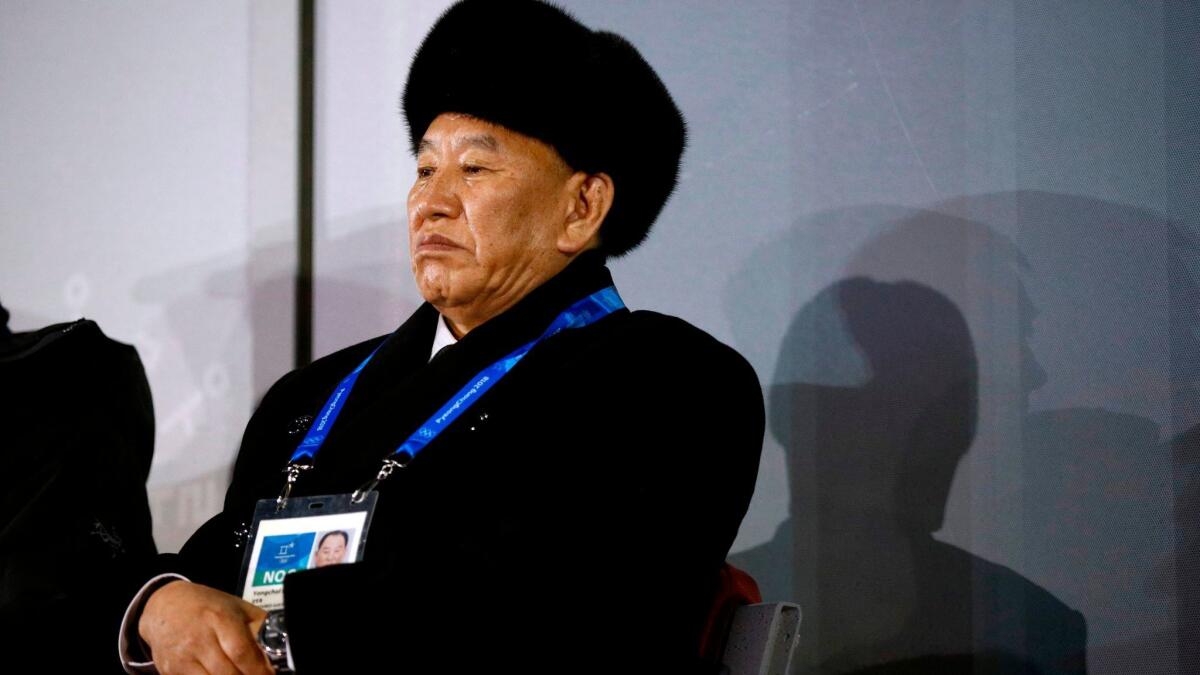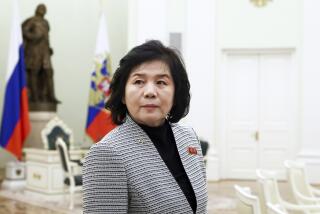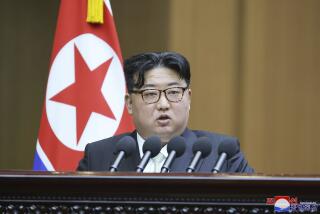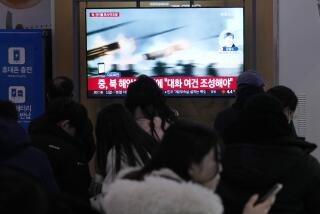North Korean envoy, in a rare visit to the South, opens door to U.S. talks

The diplomatic thaw created on the Korean peninsula by the Winter Olympics showed vague signs Sunday that it could extend past the Games — and perhaps even include talks between the United States and North Korea.
The South Korean presidential office said the totalitarian state — which has not held high-level talks with the United States in years — might be open to dialogue now.
The potential for any discussions, which remains vague and perhaps premature, came after a high-level delegation from the North visited Pyeongchang, South Korea, for the closing ceremony of the Games.
“The North Korean delegation also expressed its desire for DPRK-US dialogue,” said a statement from South Korea’s presidential office, using the diplomatic initialism for the Democratic People’s Republic of Korea. “They, too, thought that North-South relations and DPRK-US relations should advance together.”
The sporting event helped restart stalled dialogue between the North and the South after the two sides agreed to a joint march together during the opening ceremony and to field a combined women’s hockey team. The South also opened its nation to a sizable delegation from the North, including an orchestra and cheerleading squad, as a sign of goodwill and cultural solidarity between the two nations.
The potential talks between the United States and North Korea came two weeks after another delegation from the North — this one involving Kim Jong Un’s sister, Kim Yo Jong — invited South Korean President Moon Jae-In to a summit in Pyongyang.
Moon has said “conditions” would need to be set ahead of any top-level, inter-Korean summit, which would be the first in more than a decade, an indication of his desire to see progress beforehand by the North.
The thaw between the North and South, which are still technically at war after a six-decade ceasefire following the Korean War, had been welcomed by international observers who support a peaceful resolution to tensions caused by the North’s illicit pursuit of nuclear weapons and long-range ballistic missiles.
But a key sticking point in whether the talks might have any lasting effect on the security environment had been whether the North might engage with the United States, its top adversary and also a key South Korean ally.
Uncertainty among Korean security experts remained high on Sunday about whether the diplomatic hints — which came as President Trump’s daughter Ivanka attended the closing ceremony — might amount to substance later.
The North and the United States, which has 28,000 troops in the South, remain at odds over the nation’s nuclear weapons program, which has progressed in recent years despite international condemnations and economic sanctions.
It’s unclear whether the Trump administration — or the North Korean leader, Kim Jong Un — might ultimately decide on terms to proceed with talks. Both sides, in theory, have shown a willingness to talk in recent years as the North’s nuclear program and missiles advanced into a realistic threat to the American mainland. Both have also shown a willingness to set terms that prevented any dialogue.
The White House issued a statement Sunday that seemed to set denuclearization as a precondition of talks.
“The maximum pressure campaign must continue until North Korea denuclearizes,” the statement said. “We will see if Pyongyang’s message today, that it is willing to hold talks, represents the first steps along the path to denuclearization. In the meantime, the United States and the world must continue to make clear that North Korea’s nuclear and missile programs are a dead end.”
Observers have said North Korea is unlikely to commit to denuclearization, especially as a precondition to any dialogue.
“The reality is that there is still a large gap in the positions of both sides,” said James Kim, a research fellow at the Asan Institute for Policy Studies in Seoul. “Without some answers to these questions, I am not sure how the two sides would come together for any serious dialogue or discussion.”
That uncertainty was echoed by others who follow the tensions between the North and the United States, which threatened to escalate to armed conflict last year as the North tested three intercontinental ballistic missiles and conducted an underground nuclear test. The Trump administration last week announced even more economic sanctions against the North, focused on its economy through shipping.
The statement about potential dialogue came amid the hype about peace and the Olympics. It occurred on Sunday after an hourlong discussion with the North’s delegation, which included a controversial hard-line general, Kim Yong Chol, now charged with inter-Korean relations, and the South’s president, Moon.
Moon’s office, which said the meeting took place in Pyeongchang, said the discussion included the South’s national security and intelligence chiefs, among others.
Talks with the U.S. remain a vague but potentially promising development after the Olympics discussions, talks, which resulted in the North’s participation only after Kim Jong Un gave a New Year’s Day speech in which he made some conciliatory statements toward South Korea.
“It is a straightforward signal from a high-ranking North Korean — a hawk, no less — that they’re prepared to talk,” said John Delury, an associate professor of Chinese studies at Seoul’s Yonsei University. “That doesn’t happen every day. That’s significant, but for it to be of consequence, talks actually have to happen.”
The discussion also occurs as North Korean state media said the potential resumption of war exercises among the South and the United States, which have long angered the North, could end hopes for any talks.
It was another reminder that the North’s intentions remain unclear and unpredictable. It’s possible the North is simply trying to win favor now amid the Olympic goodwill ahead of the exercises, which were delayed until at least late March, said Duyeon Kim, a visiting senior research fellow at the Korean Peninsula Future Forum in Seoul.
“We will need to see if and what their conditions are for talks,” she said.
Stiles is a special correspondent.
UPDATES:
11:15 a.m.: This story was updated with a White House statement.
8 a.m.: This story was updated with background on a separate proposal on talks between North Korea and South Korea.
7:40 a.m.: This story was updated throughout with Times reporting.
This story was originally published at 4:40 a.m.
More to Read
Start your day right
Sign up for Essential California for news, features and recommendations from the L.A. Times and beyond in your inbox six days a week.
You may occasionally receive promotional content from the Los Angeles Times.







